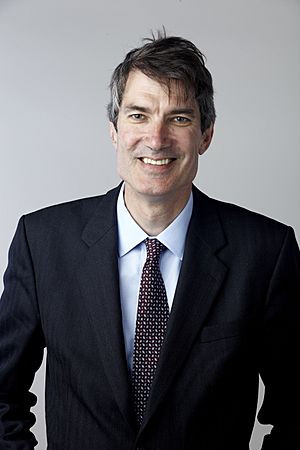Steven Cowley facts for kids
Quick facts for kids
Sir Steve Cowley
FRS FREng FInstP
|
|
|---|---|

Cowley in 2014
|
|
| 7th Director of the Princeton Plasma Physics Laboratory | |
| Assumed office 1 July 2018 |
|
| Preceded by | Richard J. Hawryluk (interim) |
| 31st President of the Corpus Christi College | |
| In office 1 October 2016 – 30 September 2018 |
|
| Preceded by | Richard Carwardine |
| Succeeded by | Helen Moore |
| Personal details | |
| Born |
Steven Charles Cowley
1959 (age 65–66) Cambridge, Cambridgeshire, England |
| Children | Sean Cowley and Brendan Cowley |
| Alma mater | |
| Known for | Fusion power |
| Awards | Knight Bachelor (2018) Glazebrook Medal (2012) Harkness Fellowship (1981–83) |
| Scientific career | |
| Fields | |
| Institutions |
|
| Thesis | Some Aspects of Anomalous Transport in Tokamaks: Stochastic Magnetic Fields, Tearing Modes and Nonlinear Ballooning Instabilities (Convection) (1985) |
| Doctoral advisor | Russell Kulsrud |
Sir Steven Charles Cowley, born in 1959, is a brilliant British scientist. He is a theoretical physicist, which means he uses math and theories to understand how the universe works. He is a top expert in nuclear fusion and astrophysical plasmas. Plasmas are like a super-hot, electrically charged gas.
Since July 1, 2018, Sir Steven has been the director of the Princeton Plasma Physics Laboratory (PPPL) in the United States. This lab is part of the United States Department of Energy. Before this, he was the president of Corpus Christi College, Oxford, starting in October 2016. He also led the EURATOM / CCFE Fusion Association and was the chief executive of the United Kingdom Atomic Energy Authority (UKAEA). In July 2024, he became the chair of the board of trustees for the Faraday Institution.
Education and Early Studies
Sir Steven Cowley earned a scholarship to Corpus Christi College, Oxford. He graduated in 1981 with a Bachelor of Arts degree in Physics. After that, he went to Princeton University in the U.S. as a Harkness Fellow.
In 1985, he earned his PhD from Princeton. His research focused on tokamaks, which are machines designed to create fusion energy. His supervisor was a scientist named Russell Kulsrud.
Career and Research in Physics
After getting his PhD, Sir Steven did more research at the Culham Centre for Fusion Energy (CCFE). He returned to Princeton in 1987. In 1993, he joined the faculty at the University of California, Los Angeles (UCLA), becoming a full professor in 2000.
From 2001 to 2003, he led the plasma physics group at Imperial College, London. He was also a part-time professor there. In September 2008, he was chosen to lead the EURATOM / CCFE Fusion Association. Then, in November 2009, he became the CEO of the UKAEA.
On March 18, 2015, he was elected the 31st President of Corpus Christi College, Oxford. This is his old college. He started this role on October 1, 2016. He was the first scientist ever to hold this important position. On July 1, 2018, he became the director of the Princeton Plasma Physics Laboratory (PPPL).
Sir Steven's main research is about plasmas and nuclear fusion. He also studies astrophysical plasmas, which are found in space. He works on projects like the Joint European Torus (JET) and the International Thermonuclear Experimental Reactor (ITER). These are huge experiments trying to create fusion energy. His work has been supported by important science councils. He also helped lead a big study on plasma science in the United States.
Awards and Special Recognitions
Sir Steven Cowley was elected a Fellow of the Royal Society (FRS) in 2014. This is a very high honor for scientists in the UK.
The Royal Society noted that he is a top expert in plasma theory. Much of his research has been about understanding plasma turbulence in nuclear fusion. Turbulence is like swirling, chaotic movement. Controlling this movement is key to making fusion energy work.
Nuclear fusion could provide clean and safe energy for the future. However, scientists still need to find a way to make it produce more energy than it uses. Sir Steven has been a leader in the UK's part of ITER. ITER is an experimental reactor that aims to make nuclear fusion practical.
Sir Steven is also interested in plasmas found in space. He showed that these plasmas are also turbulent. This turbulence helps shape their magnetic fields. In 2009, he gave a TED talk called "Fusion is Energy's Future." He also received the Glazebrook Medal in 2012 for his leadership in physics.
His election certificate also mentioned his work on "multi-scale approach" to understanding plasma turbulence. This helps scientists predict how plasmas behave in fusion experiments. He also discovered why some confined plasmas have sudden, explosive eruptions. His work has shown that plasmas in the universe are turbulent. He described how this turbulence affects the magnetic fields in space.
Sir Steven was also elected a Fellow of the American Physical Society (APS) in 1998. He became a Fellow of the Institute of Physics (FInstP) in 2004 and the Royal Academy of Engineering (FREng) in 2014. In 2015, he received an honorary fellowship from the Institute of Engineering and Technology. In 2011, he joined the UK Government's Council for Science and Technology.
In 2018, Sir Steven was made a Knight Bachelor for his contributions to science and nuclear fusion. This means he received the title "Sir." In July 2019, the University of Lancaster gave him an honorary degree. This recognized his standing as a global expert on fusion energy.

